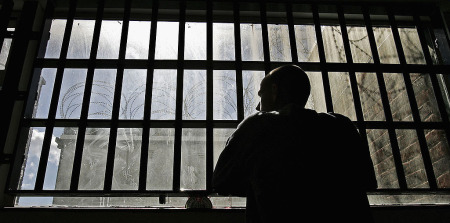Should the church be involved in criminal justice reform?

The tragic death of George Floyd has exposed once again a festering problem that has been ingrained in American life since the first slave ship dropped anchor off Virginia in 1619.
“Racism in America is like dust in the air,” former NBA great Kareem Abdul-Jabbar wrote in the Los Angeles Times. “It seems invisible — even if you’re choking on it — until you let the sun in. Then you see it’s everywhere.”
Racism is in our criminal justice system. Sadly, it’s also in many of our churches.
And, if you open your eyes, you can see it in the details of everyday life, like driving through a different part of town.
Revealing research
Research shows that blacks are more likely to be pulled over for traffic stops than whites, which comes as no surprise to Sen. Tim Scott, a black Republican from South Carolina. He was pulled over by law enforcement seven times in one year, usually for “nothing more than driving a new car in the wrong neighborhood, or some other reason just as trivial,” he said.
In a 2018 report to the United Nations, the Sentencing Project concluded, “African Americans are more likely than white Americans to be arrested; once arrested, they are more likely to be convicted; and once convicted, they are more likely to experience lengthy prison sentences.” Other research shows that blacks have more negative attitudes toward the criminal justice system than whites.
The United States has the largest prison population in the world, roughly one-quarter of the world’s incarcerated, and black Americans are far more likely than white Americans to be in prison.
But the passage of a bipartisan criminal justice bill in 2018 provides a road map for enacting positive change.
A diverse cast of characters, including celebrity Kim Kardashian West, liberal CNN commentator Van Jones, Jared Kushner (President Donald Trump’s son-in-law), and evangelical advisors to the president worked to get the bill passed by Congress.
Kushner, in a first-person article in Time magazine, described the process of getting Trump’s support. “Jared, this sounds like a pretty liberal issue,” the president said at first.
During a meeting to discuss the policy implications, one of Trump’s aides told him, “You promised during your campaign to fight for the forgotten men and women of this country. There is no one more forgotten or underrepresented than people in prison.”
After hearing the presentation, Trump said, “That’s really sad. These people make a mistake, do their time, get out and then have all of these challenges. In some ways, what do we expect them to do?”
Trump told Kushner to work with the attorney general to make sure the bill wasn’t “soft on crime,” a key part of his agenda, then called legislators to gain support. On Dec. 21, 2018, he signed the First Step Act into law.
“This legislation reformed sentencing laws that have wrongly and disproportionately harmed the African American community,” Trump said in his State of the Union address in 2019. “The First Step Act gives nonviolent offenders the chance to reenter society as productive, law-abiding citizens. Now, states across the country are following our lead. America is a nation that believes in redemption.”
The church’s role in criminal justice reform
As the name of the law implies, much remains to be done, and the church has a role to play in stemming the racism that drives unequal justice.
Dr. Martin Luther King Jr. famously said that “11 o’clock on Sunday morning is one of the most segregated hours, if not the most segregated hour, in Christian America.” Some cities in the South still have two First Baptist Churches, one black and one white.
The church can change hearts. But Jemar Tisby, author of The Color of Compromise: The Truth about the American Church’s Complicity in Racism, says that it also should encourage activism. “Evangelical promotion of racial equality must spill out beyond the church walls and conference panels and into city halls, courtrooms, and streets,” he wrote.
The late Billy Graham personally removed the ropes separating the white and black sections at one of his crusades in the South in the early 1950s. “I decided that I would never preach to another segregated audience,” he said.
Yet he told The Associated Press in 2005 that he wished he had done more for the Civil Rights movement, including participating in one of the era’s great marches in 1965. “I think I made a mistake when I didn’t go to Selma,” he said.
Bryan Stevenson, author of Just Mercy and founder of the Equal Justice Initiative, said that ultimately the church won’t be judged by things like the size of its offering or the beauty of its music.
“We’re going to be judged by how responsive we are to the poor and the neglected and the condemned and the incarcerated, the hungry,” he told The Christian Post. “We are called in the Gospels to visit those who are in jails and in prisons and to stand with those coming out of those spaces.”
Graham, considered the greatest evangelist since the Apostle Paul, made winning souls his life’s mission.
King, the leader of the Civil Rights movement, spent his life working for people Jesus called “the least of these.”
Can’t we, as the church, do both?





















